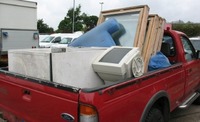Waste left in vehicles could cost sellers a fortune
 The value of used vehicles being sold at auction by businesses could, quite literally, be wasting away, according to BCA (British Car Auctions), UK vehicle auction company. The company has issued a warning to commercial vehicle sellers to be extra-vigilant over the growing issue of waste being left in commercial vehicles.
The value of used vehicles being sold at auction by businesses could, quite literally, be wasting away, according to BCA (British Car Auctions), UK vehicle auction company. The company has issued a warning to commercial vehicle sellers to be extra-vigilant over the growing issue of waste being left in commercial vehicles.With the Landfill Regulations 2002 (England and Wales) legislation introduced from 30th October on disposal and sorting of waste, there are potentially serious financial implications for everyone involved in selling vans. When waste is left in vehicles, there are costs for waste removal, decontamination and hazardous waste handling. As of 30th October all landfill has to be separated into glass, textiles and plastics. Hazardous waste such as paint, solvents and even oily rags have to be safely and separately disposed of.
BCA’s Duncan Ward commented “Increasing legislation and corporate responsibility issues mean businesses must be aware of the condition their vehicles are in at the end of their working life.”
He continued “We are seeing increasing instances where waste such as batteries, concrete, building rubble, rubber tyres and wood are left in vehicles. The costs of disposals can range from £75 for a small load to upwards of £250 for large loads. For hazardous waste the costs can escalate again as they have to be handled and disposed of according to strict Health & Safety guidelines.”
The costs of incorrect disposal are even more severe. A minor offence can get a £300 on the spot fine and this would include putting waste in the wrong container, for example. Fines rise up to a maximum of £5,000 and six months in prison for fly tipping or dumping. For serious offences such as soil contamination or mixing hazardous waste, it can mean an unlimited fine and up to two years in prison. Businesses who neglect to empty their vehicles of waste before sending them to auction could be exposed to these fines while the vehicle is awaiting sale.
BCA is advising all businesses that use commercial vehicles to put in place procedures that ensure potential waste violations are identified at the end of a vehicle’s working life, and suggests vehicles should be inspected before being sent for remarketing. In particular, this will help those responsible for a company’s commercial fleet to identify potential problems before they arise.
Ward concluded “Quite rightly, businesses focus very closely on how much their commercial vehicles sell for at auction, but by sending vehicles full of waste and in effectively unsaleable condition, some are incurring spiralling waste disposal costs and delays that could be avoided. It is vital for owners and operators to make sure these costs are minimised and to keep up to date with this legislation.”

